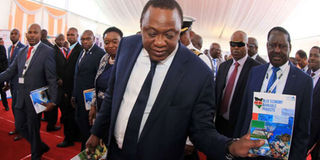Uhuru raises food security question at blue economy conference

President Uhuru Kenyatta and Former Prime Minister Raila Odinga visit exhibition stands on the second day of the Sustainable Blue Economy Conference at the Kenyatta International Convention Centre in Nairobi on November 27, 2018. PHOTO | JEFF ANGOTE | NATION MEDIA GROUP
What you need to know:
- The president said the easiest approach is to increase community resilience and protect the environment.
- Food security is one of the four pillars of the president's Big Four agenda.
- The president also urged investors to engage with counties on projects in the blue economy sector and explore ways to collaborate.
The biggest question the world must answer is how to feed the projected population of nine billion people in 2050, President Uhuru Kenyatta has said.
Speaking during the Sustainable Blue Economy Conference on Tuesday, the president said the easiest approach is to increase community resilience and protect the environment.
PARTNERSHIPS
Food security is one of the four pillars of the president's Big Four agenda. The others are universal healthcare, affordable housing and manufacturing.
President Kenyatta further urged collaboration among the different levels of government and city-to-city partnerships.
He also emphasised the need to focus on coastal cities as three quarters of the world's population lives in them.
“Our grand vision should not be just about building cities and towns, but rather also about creating jobs and liveable neighbourhoods for our communities,” he said at the Kenyatta International Convention Centre in Nairobi, during
the global forum for governors and mayors, which took place on the sidelines of the conference.
Mr Kenyatta pointed out that the summit is timely, as governments and non-governmental organisations are realising the imperative to work together for a sustainable future for humanity.
He told the meeting that collaboration among countries, cities and communities is key to a sustainable future.
GLOBAL WARMING
The president said the world has a once-in-a-lifetime opportunity to create a model that is environmentally friendly and which allows maximum exploitation of resources, both on land and in water bodies.
On global warming, President Kenyatta said action should be taken to minimise the impact on coastal cities.
Mr Kenyatta noted that one of the biggest threats to cities around the world is sea level rise, caused by the expansion of water at higher temperatures and melting ice sheets in the north and south poles due to climate change and variability.
“Scientists estimate that 275 million people worldwide live in areas that will eventually be flooded at 3C of global warming. Although sea levels will not rise instantaneously, the calculated increases will be locked in at a temperature rise of 3C, meaning they will be irreversible even if warming eventually slows down," he noted.
INVESTMENT
President Kenyatta said Kenya has several towns along the coast, two big cities, lakes and rivers.
He said Mombasa and Kisumu, in particular, offer investment opportunities in sectors including renewable energy, tourism, fish processing and storage, maritime transport, and shipping.
As such, he asked investors to take advantage of opportunities available in water supply, sanitation and waste management.
“The national government and our counties have put together a portfolio of bankable investment projects of almost $1.4 billion in these areas,” he said at another forum for businesses and the private sector, that also took place on the sidelines of the blue economy conference.
COUNTY PROJECTS
The president also urged investors to engage with counties on projects in the blue economy sector and explore ways to collaborate.
“We look forward to enhanced collaboration between cities and towns, and with governments, international organisations and the business sector, to sustainably grow our cities and towns," he said.
He added, “We have a once-in-a-lifetime opportunity to shift increased urbanisation on to a more environmentally sustainable and socially just path.”
The president told the meeting that the health of water resources should never be compromised for short-term economic gains.
He said the Kenyan government will continue playing a facilitative role that will enable private businesses to thrive by exploiting opportunities in the blue economy.
SHARED EXPERIENCES
President Danny Faure of Seychelles said his country is committed to sharing its experiences on the blue economy with other African nations.
Regarding Kenya's position as the host of the conference, Mr Faure termed it a sign that Africa has finally woken up to the reality of the wealth in its oceans and lakes.
“We are committed to working with the African Union to ensure synergy in the development of the blue economy," he said.
African Union Commission chairperson Moussa Faki, UN-Habitat Executive Director Maimuna Shariff and Nairobi Governor Mike Sonko also spoke at the governors' and mayors forum.




